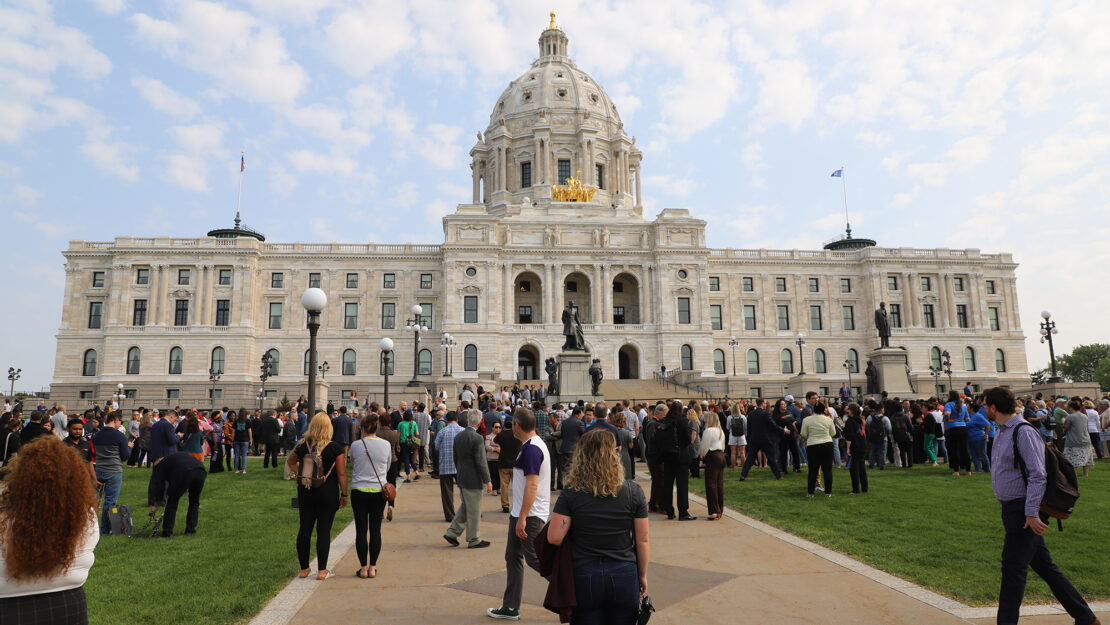Tax bill scales e-tabs back severely

‘It’s going to be further back than when they came out’
ST. PAUL — The Minnesota Legislature on May 21 sent Gov. Tim Walz a tax bill that provides some tax relief for charitable gambling but scales back electronic pulltabs.
“In very simple terms to me, it’s going to be a true reflection of a paper counterpart,” said Allen Lund, gambling manager for Osseo-Maple Grove Post 172 and former head of Allied Charities of Minnesota. “It’s going further back than when they came out.”
Walz signed the tax bill, and others, on the steps of the Capitol on May 24.
Charitable gambling is a major way for The American Legion, in Minnesota and many other states, to raise funds for assisting veterans, providing honor guards, supporting youth activities, helping fire departments and other local causes. There are 190 American Legion posts with charitable gambling licenses in Minnesota and four American Legion Auxiliary units.
E-tab revenue has helped offset rising costs facing the posts and the donation recipients, said Lund, who is on the American Legion Department of Minnesota Legislative Committee.
Here is what is in the tax bill regarding charitable gambling:
• Effective Aug. 1, 2023, new e-tab games must meet the revised standards. The Gambling Control Board must remove any and all remaining games not meeting the new standards by Dec. 31, 2024.
• The new games, from e-tabs to e-bingo, cannot have free plays, bonus games, screens (i.e.: the kind that open from the first screen) or any other game features triggered from the result of the initial game.
• The new games require players to manually activate each ticket and each row on the ticket. This gets rid of the “open all” button.
• The new games must be certified from a Gambling Control Board-approved testing laboratory to ensure they are in compliance.
• Effective July 1, 2024, licensed e-tab distributors may not charge a licensed gambling organization more than 25 percent of gross profits. Presently, they charge anywhere from 26 to 30 percent.
• Effective July 1, 2023, for organizations with combined net receipts under $87,500, the state tax is reduced from 9 to 8 percent.
• Effective July 1, 2023, for organizations with combined net receipts over $87,500 but under $122,500, the state tax is reduced from 18 to 17 percent.
• Effective July 1, 2023, for organizations with combined net receipts over $122,500 but under $157,500, the state tax is reduced from 27 to 25 percent.
• Effective July 1, 2023, for organizations with combined net receipts over $157,500, the state tax is reduced from 36 to 33.5 percent.
• Existing law says any organization with gross receipts over $750,000 in any year must have an annual financial audit of its gambling activities. The bill says, effective after June 30, 2023, calculation of that figure does not include receipts from electronic pulltabs.
• Effective the day after enactment, e-pulltab manufacturers must complete and submit annual audits from an independent accounting firm.
Lund said the measure forces game manufacturers to have to rework the games.
“No bonuses. No free games,” he said. “It will be that you open three windows and you will know that you win or you lose, and that’s it.”
He said the issue has been around since 2015-16 and it is no coincidence that changes have come out after the pro football stadium was paid off.
Allied Charities of Minnesota Director Rachel Jenner said courts have ruled twice that e-tabs did not resemble slot machines.
Minnesota Indian Gaming Association is behind the push to remove the “open all” function on e-tabs to defend what its member tribes believe to be an infringement on slot machines.
Slot machines, Jenner said, have variable prize structures, jackpots and unlimited bets. E-tabs do not.
“Our e-tabs in Minnesota already are more restrictive than in other states,” she said. “Now they are just trying to take it one step further.”
She said charitable gambling operations never have had issues with how casinos conduct gambling.
“We want the casinos to succeed and run a good business,” she said, “and we ask that they respect our right to have games and support our communities and do the best we can with our games.”


